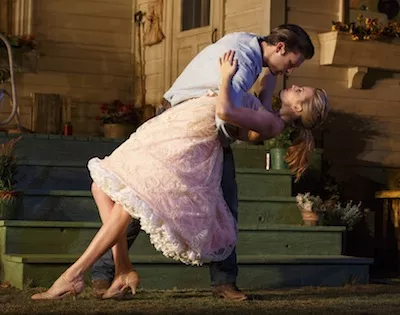With a restless hero who is both an outsider and a fallen football idol, William Inge's Picnic - being staged at American Airlines Theatre in N.Y.C. - is instantly recognizable as a '50s story, breathing the same post-war air as Cat on a Hot Tin Roof, The Rainmaker, Death of a Salesman, The Wild One, Music Man, and Carousel. Hal Carter arrives in a small Kansas town broken and penniless, looking for work, acceptance, and a leg up - and bristling with a masculine magnetism that neither he nor any female can resist.

The only person in town who knows Hal is his one-time frat brother and roommate Alan Seymour. Other bluebloods in the fraternity apparently gave Hal a hard time despite - or perhaps because of - his jock celebrity. So Seymour's receptivity and loyalty to Hal, along with his presumed inheritance, make him the worthiest bachelor in town for ultra-lovely Madge Owens. But Madge is uncomfortable with her beauty, less anxious than her mom Flo for a proposal from Alan, with a primal dimension that responds to Hal's magnetism more than Alan's money.
Hal and Madge begin to spark just before sunset in Act 2, but the real fireworks and betrayals occur at intermission during the Labor Day picnic prior to Act 3. A parallel climax occurs in the subplot, storekeeper Howard Bevans' tepid courtship of spinster schoolteacher Rosemary Sydney, elevating the rustic picnic into a nocturnal fertility rite. Yet the most memorable moment of Picnic occurs when Inge manages to make his two plots intersect. A pre-picnic bacchanal begins when Howard opens a bottle of booze and coaxes Rosemary into drinking. Tipsy Rosemary turns rabid in the heat of a slow dance with Hal and rips his clean dress shirt.
Toss in Madge's younger sister Millie taking a couple of sips during the ensuing confusion, and you have a full-fledged catastrophe, with Flo and Rosemary placing the blame entirely on Hal's beefy shoulders. Hal's passport into propriety has been shredded, exposing his infernal midriff. But given that we're in an obscure front yard in Kansas, Inge's intended takeaway on the impossibility of vaulting over American class distinctions is a heavier load than this somber scene can bear.
Directed by Sam Gold, Roundabout Theatre Company's production makes its best case for the durability of Inge's script in the comedy subplot. Reed Birney keeps Howard genial and lusty enough to justify Rosemary's love for him despite his wariness toward matrimony. Notwithstanding her misdeeds and indiscretions, Elizabeth Marvel makes it surprisingly easy for us to ultimately root for Rosemary as she desperately strives to break free from her straitlaced loneliness.
Madge's urge to escape, powered by the flames of youth, isn't nearly as desperate, and with Maggie Grace in the role, we are barely aware of how much it could matter 60 years ago who you surrendered your virginity to. On the contrary, when Madge declares her willingness to seek employment in pursuing her dream, Grace seems quite the modern woman. Sebastian Stan is more than sufficiently sculpted to attract the gapes, leers, and sighs that the womenfolk bestow on Hal, yet I was impressed by how much naturalness he brought to a role that could be quite trite in its shyness and anguish.
With a back wall of corrugated aluminum stretching up to the flyloft, Andrew Lieberman's set design isn't altogether realistic. But it provides enough interior space in the Owens home for Gold to stage some of the action there and gives us a good two-storey chunk of the neighboring Potts home. The scale befits a production with a dozen actors, and the homely aluminum wall becomes briefly apropos when we hear the sounds of a freight train offstage.
The Roundabout cast, as usual, is admirably deep with a couple of notable Broadway debuts. Mare Winningham nicely modulates Hal's most implacable foe so that the Flo's mother-hen attributes are a balanced mix of overprotectiveness and love. Alan comes double-wrapped in ambivalence, a plausible choice for Madge until Hal shows up - and Hal's staunch supporter until he sweeps her off her feet. Ben Rappaport captures this clean-cut and conventional wishy-washiness to perfection.
Oscar/Tony/Emmy winner Ellen Burstyn may seem somewhat underemployed as next-door neighbor Helen Potts. Nevertheless, she's the first female in town to leer at Hal, offer him breakfast, and give him a job. Throughout the ex-football star's daylong ordeal, she best personifies Inge's cheerful, unreserved acceptance of Hal and the playwright's all-inclusive Labor Day spirit. (Through February 24 at American Airlines Theatre)
Coming soon: Perry's complete 2013 Broadway/Off-Broadway roundup, including reviews of The Mystery of Edwin Drood, Nice Work If You Can Get It, The Other Place, Bunnicula, Clive, Collision, Forbidden Broadway: Alive and Kicking, My Name Is Asher Lev, and Rain Pryor: Fried Chicken and Latkes.
